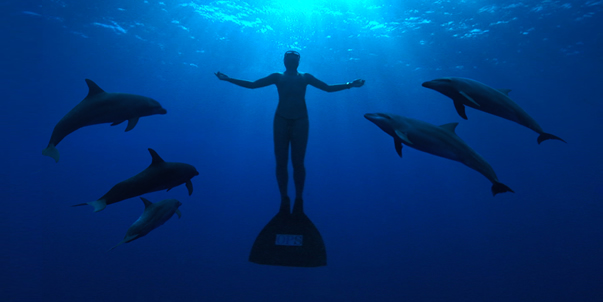Amidst the protests of right-wing groups that opposed to the screening [en] of the Oscar-winning documentary “The Cove” [en], three theaters decided not to show it.
The controversial movie which records the slaughter of dolphins in the inlet of Taiji, a small village on the Southern Coast of Japan and historically dependent on whaling, was set to be screened [en] in Japanese cinemas at the end of June.
But, after threatening calls and protests in front of the distribution company, two cinemas in Tokyo and one in Osaka declined to screen it. Another twenty three will still screen it, but on a yet to be defined date.
The documentary has been harshly criticized in Japan as ‘anti-Japanese’ by many, although very few have had the opportunity to watch it.
Its reputation preceded it and it became known as the infamous movie where a group of Americans land in Japan, then proceed to outwit the local fishermen and criticize Japanese traditions.
Blogger at Ki ni naru nikki says he realizes the reasons for the protest.
日本人は一般的にいるかの肉を食べいないもの。。。
ザコーヴへ抗議が殺到するのも、分かります。。。
でもちょっと、見たいかな。。。ザコーヴの書籍でも読もうかな。
because the Japanese people normally don't eat dolphin meat … but I'd be a little curious to watch it …
maybe I'll read the book.
So far the only screening of “The Cove” was at the Tokyo International Film Festival (TIFF) in November, though it was initially rejected [en].
In the film, made with high-tech equipment such as camouflaged high-definition cameras, anti-dolphin-hunting activists secretly documented the slaughter of dolphins and the black market of dolphin meat sold as whale meat. They also highlighted the dangers of mercury, well known in Japan since the so called Minimata incident [en], contained in the dolphin meat.
Blogger at umikarahajimaru, who saw the film at the TIFF, criticizes it for its biased and overly emotional tone. In his opinion this makes it more of an activist-authored movie rather than a journalistic style documentary.
それはともかく、私が残念だと思うのは、太地町のことでも、この映画の作り手のことでもなくて、この映画の受け手のこと、つまり、こんな論理性もなく、具体的な論拠も証拠も示せずに、観客の情緒に訴えかけることで共感を得ようとするような、ドキュメンタリー映画とも言えないような代物を、最優秀ドキュメンタリー賞に選ぶアメリカ人が非常に多いことです。
[…]
太地町側は、『ザ・コーヴ』の上映中止に躍起になっているようですが、そういう活動は、かえって都合の悪いことを隠しているようにも見えるし、逆に、『ザ・コーヴ』を観てみたいという人を増やすことにもなるように思います。上映してみれば、「ひどい映画だ」という噂がさあーっと広まって、案外、早々に騒ぎが沈静化するということもあるかもしれません。
‘The Cove’ trailer
However, the threatened actions by the rightist activists won’t let Japanese people remain indifferent. Some liken it to 2008 when the documentary ‘YASUKUNI‘ [en] (about the Yasukuni Shrine) was similarly pulled [en] because it was branded as ‘anti-Japanese’.
At the time some 55 Japanese intellectuals, journalists and film directors declared themselves to be against the cancellation of the screening. Appealing to the principle of freedom of expression, they released a common statement which said they were against the censorship of the film and supported those cinemas and people who were targets of the threatened action.
renjakudo shares the text of the statement on his blog.
こういう事態が一般化すると、評価が分かれるような問題作というべき映画は上映できないことになってしまいます。そもそも海外では広く公開されているこの映画が、作品で描かれた当事国の日本で公開できないというのは、日本における「言論表現の自由」がいかに脆弱かを示す事柄といえましょう。








2 comments
In my opinion the trailer is already ridiculous, because it shows American behaviour towards dolphins (and wants to emphasize the positive aspects, which in my critical opinion it totally fails at). They put them in cages and use them for people’s amusement and company profit. Possible, that Japanese people also have dolphin aquariums and shows, I do not know this, but I think it is no better than slaughering dolphins. Who of us would want to be catched and put in a cage for his whole life?
Yes, the trailer is already highly emotional without any aspects of documentation, but I think it should still be shown. Japanese people should be able to watch it, but at the same time, journalists and bloggers should write about it and tell those people who do not see it on their own that the movie is totally biased. They could also include some critical aspects about American way of life to show that American is not the saviour.